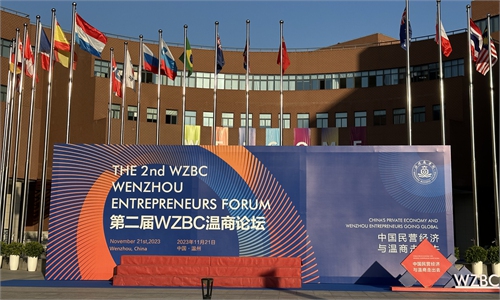
Illustration: Chen Xia/GT
Recently, two important events took place that have a close relationship with each other, but the relationship is not what one would initially expect.
Most recently, Chinese President Xi Jinping and the large delegation he led to San Francisco were warmly welcomed by large sections of the US business community. This was particularly notable at the welcome dinner hosted by friendly organizations on the evening of November 15. US businesses were extremely eager to be invited to the dinner. A little earlier, on November 4-6, Australian Prime Minister Anthony Albanese made a successful visit to China. He came with the largest ever number of Australian companies participating in the sixth China International Import Expo held in Shanghai.
So what is the relationship between these two events? Note carefully the role of US and Australian businesses in each case: In the first, many US business leaders welcomed President Xi's delegation in San Francisco; In the second, Australian businesses backed up Albanese's visit with practical and concrete actions in Shanghai. Obviously, US and Australian businesses have been making it very clear, albeit perhaps quietly and in their own way, that good economic relations with China require sound, practical and realistic government policies.
Many readers will know that the last four or five years have not seen sound, practical and realistic policies when it comes to engaging with China. It is not necessary to go into details here, since these are well-known, but in Australia, we call this "China-bashing." It became a favourite sport for many including the media, irresponsible news outlets and government leaders. However, business leaders were paying attention and as time went by, these government "policies" began hurting their economic bottom line. And these business leaders, especially those involved in organizations that had for many decades facilitated ever-deeper economic engagements with China, began to make their views known. They were saying clearly that enough is enough. It seems that the US and Australian governments have finally listened.
These developments require a deeper and more systemic analysis of the dynamics of countries like the US and Australia, and indeed all other Western countries. The basis of this analysis is found in the works of Marx and Engels. Two works are especially important: Karl Marx's 1852 work The Eighteenth Brumaire of Louis Bonaparte, which is a study of the coup that led to the Second French Empire, led by Napoleon III, and Frederick Engels' 1888 work The Role of Force in History, which is a study of how Otto von Bismarck gradually united the disparate German states and established modern Germany as a preeminent country in Europe.
The core of the argument in both works entails a contradiction. To explain: through these experiences, the "ruling elite" learned that their rule is more effective if they do not actually hold the reigns of political power. In other words, they often prefer to rule indirectly, since this is far more effective. We need to be clear about the terminology: For Marx and Engels, "ruling class" refers to the owners of capital and industry, for example, to those involved in trade and commerce. Neither Louis Napoleon nor Bismarck was from such a group, since they came from the old aristocracy and landlords of France and Germany. However, they soon learned that for the capitalist economies of France and Germany to develop, they needed to institute policy after policy that improved the conditions for the owners of capital. For these owners of capital, for this real "ruling elite," this approach turned out to be ideal.
Of course, much has developed over the ensuing 150 years, but the principle still applies. For example, in many discussions with business people from Scandinavia and Australia, I find that they emphasize that they simply want to get on with business in favourable conditions. Otherwise, they leave the politicians alone and ignore them.
However, from time to time government policies begin to be implemented that hurt the core interests of businesses. Due to internal political winds in Australia, the former government chose to take a path that was hostile to China. The US took the same path, especially from 2017 to 2018. The business leaders, business councils and chambers of commerce initially decided to wait, assuming that the political winds would soon change. When the damaging policies continued and the economic pain became more and more obvious, they let their views be known: articulating very clearly for the ears of government leaders. Enough is enough, they said. Change policy or you are out.
At the time of writing, it would seem that the governments in Australia and the US have listened to their business communities, to their economic ruling elite, and have begun to change policy in relation to China. And it is precisely an insight from Marx and Engels into the workings of the state and political power in Western capitalist countries that enables us to see why.
The author is a Marxist scholar from Australia, an overseas talent professor in the School of Philosophy at Renmin University of China, and on the editorial board of the Australian Marxist Review. opinion@globaltimes.com.cn


